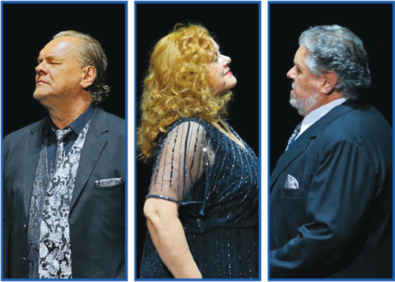Forty years after reporting on my first visit to Bayreuth (see Wagner Notes Vol. IV No. 5, November 1981), this city in the time of Covid is, in many respects, eerie. Familiar shops and restaurants have gone out of business as a result of the cancellation of last year’s Festival, and the reduction of this year’s attendees by half meant an unsettling lack of queues. From the yellowing paper in the window of the closed wine store Süsse Quelle on the Maximilianstrasse, it was evident that there is little demand for commercial rentals. I was able to get an Airbnb flat as late as June. The Weihenstephan on Bahnhofstrasse offered no after-performance dinner.
In the famed auditorium, velvet black coverings were fitted on every other seat, giving a morbid effect. But once the house lights dimmed and the invisible orchestra tuned, that unique anticipatory audience silence took hold, and we knew the Festival magic was back. I attended the new production of Holländer as well as a concert performance of Parsifal, the final season of Barrie Kosky’s Meistersinger, and the second season of the 2019 production of Tannhäuser with Stephen Gould, Lisa Davidsen, and Günther Groissböck. Hollander will be reviewed in the next issue. In brief, despite a riveting performance of Senta by Asmik Grigorian, director Dmitri Tcherniakov presented the story of a little boy who witnessed his mother’s suicide and returned to destroy the town responsible — an interesting story, but not Wagner’s.
Parsifal was led by Maestro Christian Thielemann and was deeply moving. The singers were on a bare stage (though needlessly far back) and the unmediated power of the score was overwhelmingly affecting. Gould as Parsifal, Petra Lang as Kundry, and Michael Volle as an Amfortas in deep pain, headed a superb cast. The audience allowed silence after each act before starting applause, making this extraordinary music all the more telling in concert.
Meistersinger featured many of the principals from the 2017 premiere including Volle as Sachs and Klaus Florian Vogt as Walther, but with a new Eva in Camilla Nylund and Martin Gantner replacing the scheduled Johannes Martin Kränzle as Beckmesser. Kosky’s production remains a mixed experience. Much of the comedy is tasteless and distracting, but upon third viewing it was uncommonly timely. White Americans are being reminded that their familiar historical narratives are, in many cases, neither shared nor even true; economic advances of the late 19th Century didn’t happen if you were Black. So with Nürnberg: Wagner may have chosen it as an idyllic Paradise from the mythic German past, with jolly guildsmen and civic minded citizens; but it was no Paradise if you were a Jew. Nor was it in 1865 when Wagner was writing Meistersinger with one hand and preparing to reprint Judaism in Music with the other.
Time has not been as kind to Tobias Kratzer’s 2019 production of Tannhäuser. Its narrative – of an anarchic crew of a White dwarf, a Black transvestite and a sequined whore interrupting the very performance that we are watching – is puerile and unconvincing. The use of film at a scale equal to the entire proscenium opening is unwise and distracting. However, Gould and Davidsen ripped the place up with thrilling music-making. And Axel Kober was a welcome reprieve from the messy conducting of Valery Gergiev in 2019. Still, these diversions are disappointing in a theater of such achievement.
© Wagner Notes, August 2021, a publication of the Wagner Society of New York. All rights reserved.
